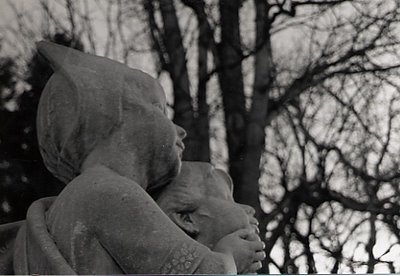Wynken, Blynken, and Nod one night
Sailed off in a wooden shoe,--
Sailed on a river of misty light
Into a sea of dew.
"Where are you going, and what do you wish?"
The old moon asked the three.
"We have come to fish for the herring-fish
That live in this beautiful sea;
Nets of silver and gold have we,"
Said Wynken,
Blynken,
And Nod.
The old moon laughed and sung a song,
As they rocked in the wooden shoe;
And the wind that sped them all night long
Ruffled the waves of dew;
The little stars were the herring-fish
That lived in the beautiful sea.
"Now cast your nets wherever you wish,
But never afeard are we!"
So cried the stars to the fishermen three,
Wynken,
Blynken,
And Nod.
All night long their nets they threw
For the fish in the twinkling foam,
Then down from the sky came the wooden shoe,
Bringing the fishermen home;
'T was all so pretty a sail, it seemed
As if it could not be;
And some folk thought 't was a dream they'd dreamed
Of sailing that beautiful sea;
But I shall name you the fishermen three:
Wynken,
Blynken,
And Nod.
Wynken and Blynken are two little eyes,
And Nod is a little head,
And the wooden shoe that sailed the skies
Is a wee one's trundle-bed;
So shut your eyes while Mother sings
Of wonderful sights that be,
And you shall see the beautiful things
As you rock on the misty sea
Where the old shoe rocked the fishermen three,--
Wynken,
Blynken,
And Nod.
eugene field
The first verse of the above poem is printed in my son's nursery book and I thought that it was quite absurd. However looking on the web I found the full poem and upon reading it you can see the great fantasy provided is unravelled by the author.
I am a sucker for lyricism and this poem has a simple but attractive musical quality. I think the author does a disservice by exploding the myth he creates. Does he do this to satisfy the child listening or parent reading? Either way I think the poem ends flat. Symbolism is all well and good where meaning is important but surely meaning is secondary in this poem.
For more information ...
eugene field
absurdist verse
Tuesday, February 28, 2006
Saturday, February 18, 2006
absurdist verse
As I was going up the stair
I met a man who wasn't there.
He wasn't there again today -
Oh! how I wish he'd go away!
author unknown
Continuing in the series of poems from my son's nursery rhyme book, this is a great lyric example of absurdist verse. It presents an idea that defies reason but seems reasonable at the same time.
I think the truly absurd is not that which seems totally fantastic but that which fools us into thinking it may be reasonable and frustrates us in our search for reason.
For more information ...
absurdism
ozymandias
I met a man who wasn't there.
He wasn't there again today -
Oh! how I wish he'd go away!
author unknown
Continuing in the series of poems from my son's nursery rhyme book, this is a great lyric example of absurdist verse. It presents an idea that defies reason but seems reasonable at the same time.
I think the truly absurd is not that which seems totally fantastic but that which fools us into thinking it may be reasonable and frustrates us in our search for reason.
For more information ...
absurdism
ozymandias
paradise lost - paradise regained III
Do we need to lose it all before we create a more fulfilled life?
The life of the emigrant can be one of losing home, losing culture, losing language and losing family. Most emigrants don't start with the intent of losing any of these but rather with the intent of gaining something else and yet a sense of loss often dominates emigrants lives.
At that point then, the emigrant is confronted by the 'myth of return', the propulsion to return home in an attempt to regain what was lost. Of course, everything has moved on, everything has changed and nothing of their 'old life' can be regained.
And so it remains for the emigrant to rediscover what it was they left home for, it remains for them to create what life they want.
Do we need to lose it all before we create a more fulfilled life? We either accept what life we have been born into or reject it and create something else.

For more information ...
paradise lost - paradise regained II
paradise lost - paradise regained I
The life of the emigrant can be one of losing home, losing culture, losing language and losing family. Most emigrants don't start with the intent of losing any of these but rather with the intent of gaining something else and yet a sense of loss often dominates emigrants lives.
At that point then, the emigrant is confronted by the 'myth of return', the propulsion to return home in an attempt to regain what was lost. Of course, everything has moved on, everything has changed and nothing of their 'old life' can be regained.
And so it remains for the emigrant to rediscover what it was they left home for, it remains for them to create what life they want.
Do we need to lose it all before we create a more fulfilled life? We either accept what life we have been born into or reject it and create something else.

For more information ...
paradise lost - paradise regained II
paradise lost - paradise regained I
Wednesday, February 15, 2006
word cloud

The word cloud above shows graphically the occurrence of words in my blog, more frequent words are bigger.
For more information ...
Try this with your site at http://www.snapshirts.com/custom.php
Subscribe to:
Comments (Atom)
